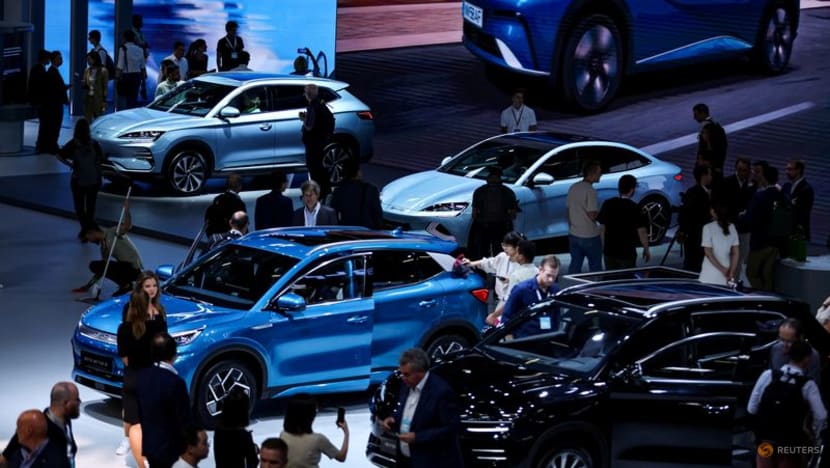Will the EU’s higher tariffs on Chinese electric cars complicate its climate goals?
Some fear that costlier electric vehicles could reduce demand and undermine the European Union’s plan to ban the sale of petrol and diesel cars by 2035.


This audio is generated by an AI tool.
BRUSSELS: Cheap and heavily subsidised Chinese electric vehicles (EVs) are flooding the market – this was the warning from senior European Union officials that sparked a probe into unfair trade practices late last year.
Now, the bloc has taken action.
The European Commission announced last Wednesday (Jun 12) that it will impose higher tariffs of up to 38.1 per cent on Chinese EVs, causing Beijing to issue threats of retaliation.
Since then, concerns have arisen that trade disputes with China could put the brakes on the EU’s climate targets.
The EU plans to reach net-zero carbon emissions by 2050. It has also committed to making all new cars and vans zero-emission from 2035.
The additional tariffs were the result of an EU probe into alleged unfair state subsidies given to China’s car manufacturing industry that posed an economic threat to European rivals.
It was also a bid by the bloc to tackle Chinese industrial overcapacity flooding the EU.
The level of tariffs set for specific EV makers depended on the level of state subsidies received by the firms. They come on top of an existing 10 per cent levy on cars imported into the EU.
The tariffs are set to kick in on Jul 4, but could be adjusted as Chinese companies have until then to provide evidence that could challenge the EU’s findings.
The European Commission’s anti-subsidy investigation will continue until November. China has rejected the allegations of unfair trade practices, calling the EU's move “protectionist behaviour”.
CHINESE EVs MUCH CHEAPER
According to analysts, Chinese brands are set to make up an 11 per cent market share in Europe this year. This is set to rise to 20 per cent come 2027.
These brands can be nearly 30 per cent cheaper than their European competitors.
While European officials hope the additional tariffs could raise more than US$6 billion annually and help level the playing field, there are worries that they will complicate the EU’s ambitious climate plans.
Some fear that costlier vehicles could reduce demand and undermine the bloc’s goal to ban the sale of petrol and diesel cars by 2035.
Electrified vehicles accounted for nearly half of all new car registrations in the EU last year.
China-EU business consultant Bart Horsten said that consumer confidence is based on the security of a product’s future, and that a potential buyer could be put off by the uncertainty of how much an electric vehicle costs.
“Also, the regulations are changing often,” he added.
Several European countries, including Germany, have also warned that trade disputes can lead to a surge in prices.
COMPETITION KEY TO DRIVING INNOVATION
Meanwhile, some industry players said competition is key to driving innovation.
Recent data suggested the EU needs a jolt when it comes to the rollout of its EV charging infrastructure.
According to the European Automobile Manufacturers Association, the EU needs to build eight times more EV charging stations per year by 2030 to hit its emissions targets. Observers said it is possible for the bloc to reach its EV goals, but only with the right ambition and political stability.
ABB E-mobility, with its new range of fast charging stations, is one of the firms trying to get the expansion of the EU’s charging infrastructure back on track.
“We can learn from a market which is ahead, so we know from looking at that market what will be coming towards us,” said Mr Floris van de Klashorst, the firm's senior vice president of products and hardware platforms.
“(This will put) us in a place where we can make sure that our products are also future-proof, and that is super important,” he added.

















